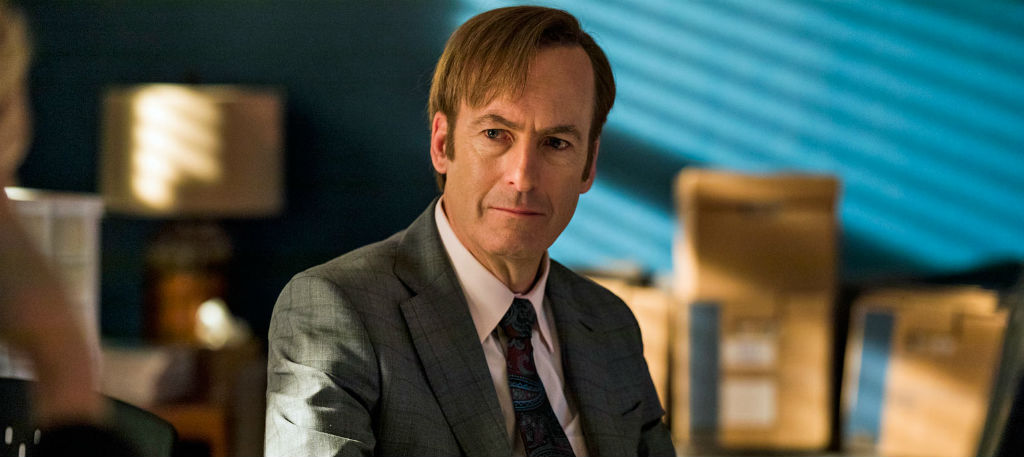
In 1998, Jimmy McGill (Bob Odenkirk) – the crooked lawyer eventually known as Saul Goodman on Breaking Bad – performs ABBA’s “The Winner Takes It All” at karaoke in celebration of him passing the New Mexico bar. Jimmy, singing completely off-key, urges his high-powered lawyer brother, Chuck McGill (Michael McKean), with whom he has a tense relationship, to join him. Chuck resists at first. He hesitates to sing after Jimmy pulls him on stage, only to take over the entire song just before the chorus, singing like a Broadway star. “The winner takes it all, the loser standing small,” Chuck sings as Jimmy, always the loser, stands behind his brother, the titular winner, on a night that’s supposed to be about him.
The scene says everything you need to know about Chuck and Jimmy. They never would have found each other, or if they did, they wouldn’t give each other the time of day. But they’re brothers and forever bound to each other whether they like each other or not. This scene also lets its actors showcase their seemingly unlimited talents: Odenkirk gets to perform karaoke terribly, showcasing his comedy background and McKean gets to show off his singing voice. The clever writing (“The Winner Takes It All” was carefully chosen) and Odenkirk’s dynamic performance add dimension to an entertaining but complex scene. This flashback from the season four finale, aptly titled “Winner,” demonstrates what’s so good about Better Call Saul, which takes place in the early 2000s, several years before the events of Breaking Bad.
Better Call Saul, which has just begun its sixth and final season on AMC (which will catch up to Breaking Bad and include Bryan Cranston and Aaron Paul reprising their roles as Walter White and Jesse Pinkman respectively), moves at a glacial pace reminiscent of the early seasons of Mad Men. Its confident, patient storytelling gives its characters ample screen time to develop and change, mostly for the worse. It focuses so narrowly on character and relationship development that the pace has deterred viewers from watching it, especially when compared to Breaking Bad, which is why it hasn’t reached near the scale of popularity as Breaking Bad, which, for a time, was as inescapable as Game of Thrones, Stranger Things, Squid Game or Bridgerton. (None of which, for the record, are as good as Better Call Saul.)
Better Call Saul marinates, then slow cooks. Breaking Bad’s rapid, plot-driven pace forced it to sacrifice quiet character moments and relationships in order to catch the character up with the story. This is not necessarily a bad thing: Breaking Bad is a brilliant show and was truly groundbreaking during a period of groundbreaking television at the peak of its Golden Age. But some relationships and characters didn’t get the time to develop fully, particularly its female characters such as Skylar White and Marie Schraeder. Better Call Saul slowly digs into its characters’ characteristics and backgrounds, uncovering more and more about both new characters like Salamanca right-hand man Nacho Varga (Michael Mando) and familiar faces like Mike Ehrmantraut (Jonathan Banks) without running out of material.
Perhaps the greatest thing about Better Call Saul is its deceptive premise. We always knew what Breaking Bad was about the destruction of Walter White, an average man corrupted by his thirst for money and power. We thought we knew what Better Call Saul would be: the story of a lawyer who becomes Saul Goodman, the criminal lawyer. It is that except Slippin’ Jimmy McGill already cuts corners and already does whatever it takes for his clients. Jimmy slips into the more corrupt Saul Goodman persona every season, but its true breaking bad arc unfolds in lawyer Kim Wexler (Rhea Seehorn), Jimmy’s best friend, on and off again girlfriend and eventual wife. Although we know the fates of many characters including Tuca Salamanca, Gustavo Fring, and Mike Ehrmantraut, another trick Better Call Saul uses to its advantage is the unknown. For as many characters on the show whose fates are familiar, there are characters who, while huge presences in Jimmy’s life, are not on Breaking Bad. Better Call Saul manipulates our lack of knowledge by putting characters such as Kim Wexler in precarious situations, knowing the audience is questioning her fate because she is not ever seen or mentioned on Breaking Bad.
Breaking Bad was built for streaming in a pre-streaming era, while Better Call Saul is a Golden Age of Television cable show in the streaming era. Glimpses of Saul Goodman’s quiet, depressing life after Breaking Bad as a Cinnabon manager, the complexities of brothers, and Albuquerque lawyer drama do not sound all that appealing, but Better Call Saul makes it gripping. We didn’t ask for an origin story about the colorful criminal lawyer from Breaking Bad, and we were confused when it was announced. But Better Call Saul is an absolutely necessary prequel that’s integral to the story of Breaking Bad, not the other way around: without Better Call Saul, its predecessor is incomplete.
